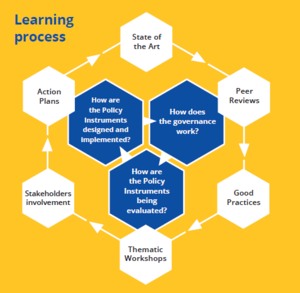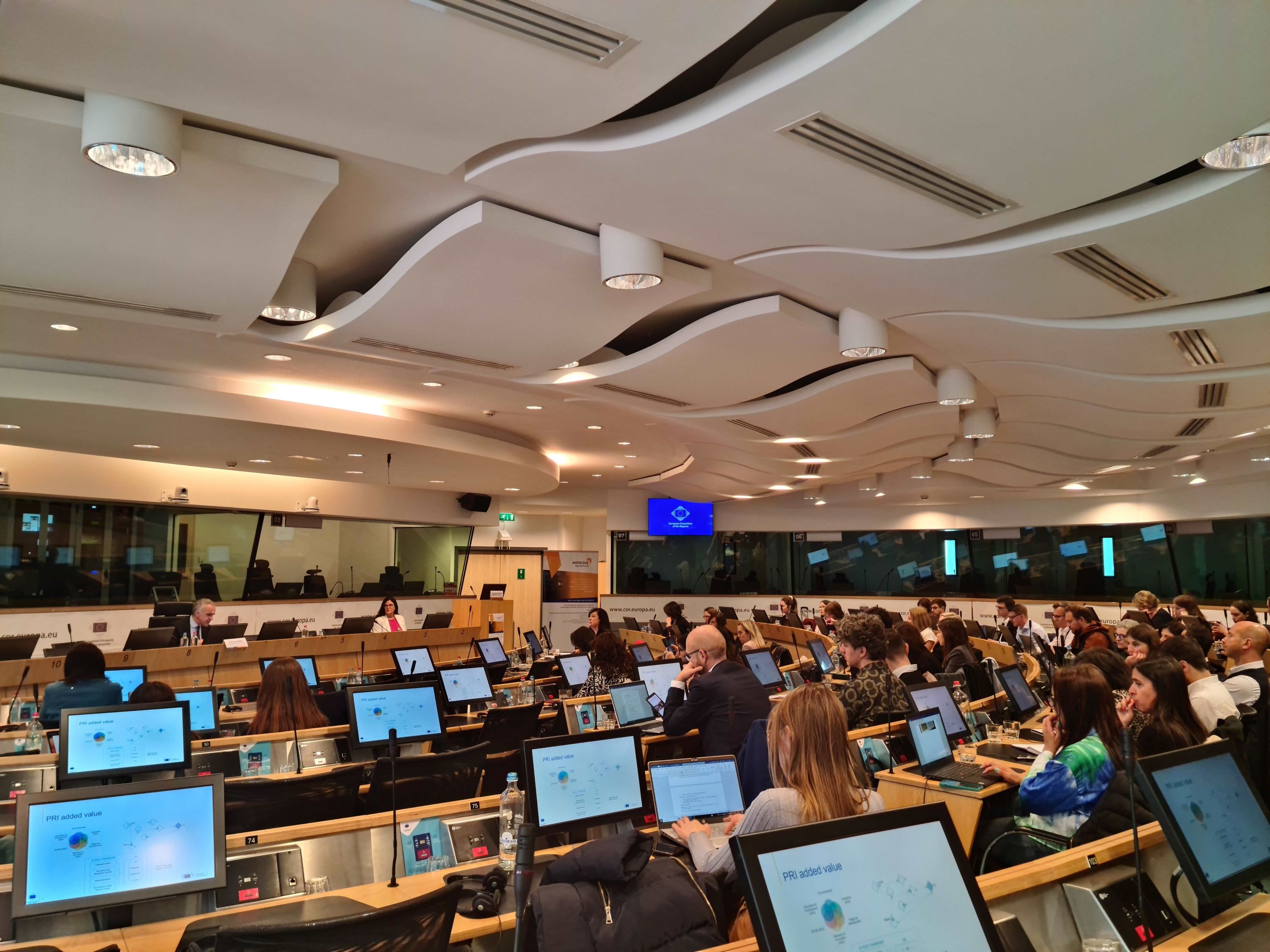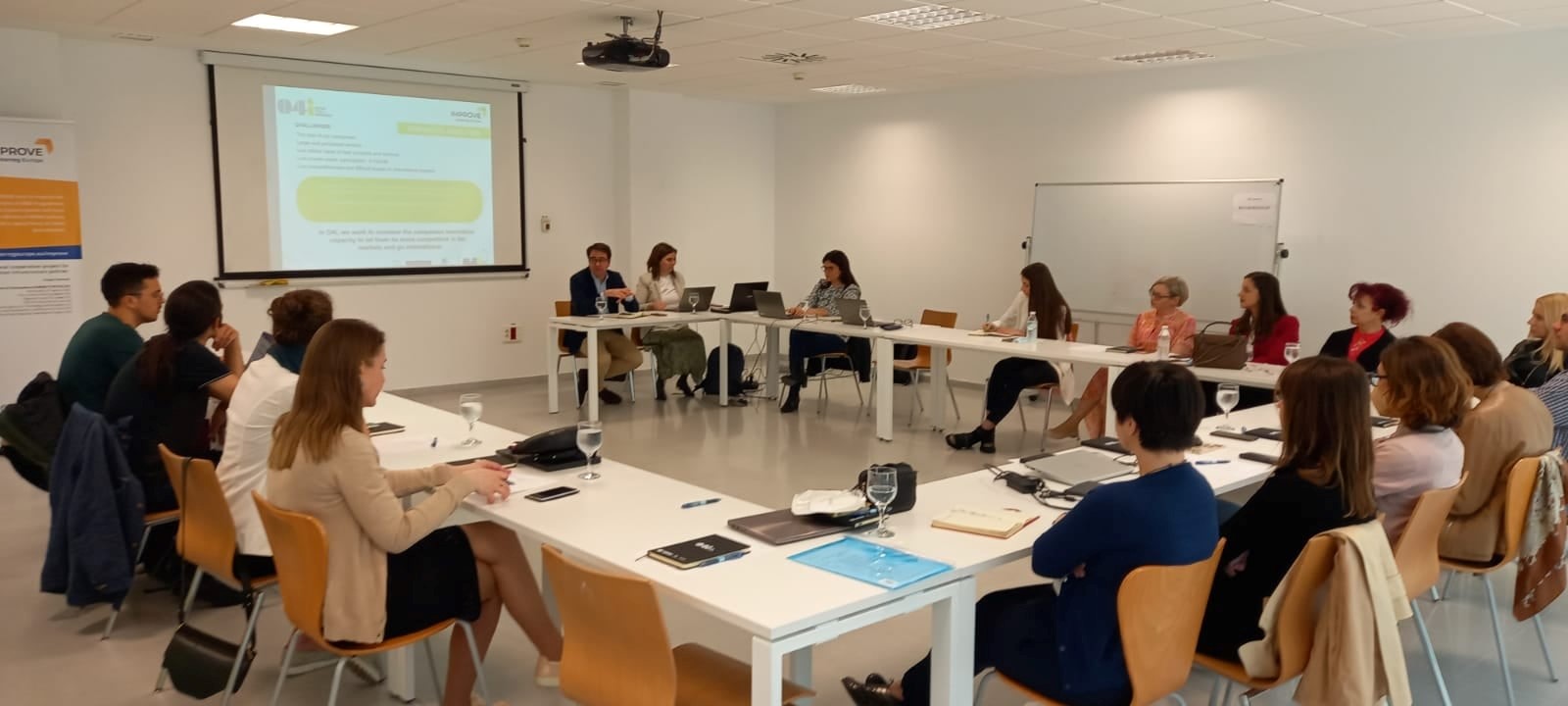
Phase 2 activities of IMPROVE project
IMPROVE partners have implemented action plans during phase 2.
The IMPROVE project brings together partners from 8 regions with the aim to improve the management and implementation of Structural Funds Programmes in the participating regions and cities. Through the improvements the project wants to ensure a better and more efficient delivery of R&D&i policies, with a special focus on the Smart Specialisation Strategies.
The interregional learning process and activities in the IMPROVE project are designed to foster the exchange of practices, experiences and knowledge and increase the capacities of partners and stakeholders involved. The basis for the learning process is the state of the art analysis each partner conducts on their chosen Structural Funds Programme (policy instrument) to be improved in the project. The objective of the state of the art analysis is to clarify the current situation in terms of management and implementation of the policy instrument. The exchange of experiences takes place by the means of peer reviews, identification of good practices and interregional thematic workshops organised in the participating regions. Towards the end of phase 1 of the project the partners will develop action plans to transfer the knowledge and experiences to their region or city to improve their chosen policy instrument with concrete actions.

Expected results of the IMPROVE project are:
€1,498,206.00
Research and innovation
The region of Extremadura (Spain) has selected Priority Axis 1 "Strengthening Research, Technological Development and Innovation" of the ERDF Operational Programme of Extremadura 2014-2020 as the policy instrument to be improved within IMPROVE project.
This policy instrument, in line with the Smart Specialisation Strategy of Extremadura (RIS3), finances different types of operations with the aim of:
The correct implementation of these operations is of great importance for the region as the Operational Programme is the main instrument for the delivery of the R&D&i policies in the region, and often administrative burdens, lack of personnel or an isolated approach might put in risk the proper deployment of the OP.
In this sense, the improvement in the management and implementation of Structural Funds by means of the exchange of knowledge and experience with other regions/countries will increase the effectiveness of R&D&i support public policies based on a better and more sustainable use of resources, better decision-making processes and a more effective governance and evaluation of the actions undertaken.
Given its regional industrial strengths (the industry plays a leading role in the regional economy with more than 17% of GDP and jobs) and in order to face economic and technological challenges, the Centre-Val de Loire (CVL) region has made industry renewal one of its top priority. To achieve this objective, CVL continuously seek to boost regional innovation capacity.
The first objective of the RIS3 is to improve the effectiveness of our regional ecosystem in order to increase the critical mass, visibility and attractiveness of the areas of specialization retained in our RIS3. We intend to better organize our ecosystem in order to support the development of our five smart specialization priorities.
More specifically, the RIS3 objective is to increase the critical mass, visibility and attractiveness of competence centres in the 5 priorities retained in the RIS3. The policy is directly linked with the CVL ERDF OP: Axis 1 Knowledge Society (TO1 directly linked with RIS3, investment priorities 1a and 1b).
The mid-term evaluation of the CVL RIS3 conducted in 2018 shown that there could be a real improvement on the coordination of the regional/national and European level funds and between ESIF and H2020 then FP9 funds. Furthermore, strengthen the steering of the RIS3 domains consistent with the management of the economic development ecosystem could foster more over the efficiency of the RIS3.
The Apulian Regional Agency for Technology and Innovation has identified the “ERDF Operational Programme of Puglia 2014-2020” as policy instrument to be improved within the project.
In detail, under the Priority Axis 1 "Strengthening Research, Technological Development and Innovation", the focus of the project will be put on the Investment Priority 1(b) “Increasing the innovative activity of firms”.
This policy instrument, in line with the Smart Specialisation Strategy of Puglia (S3), finances different types of operations with the twofold aim of:
As the Operational Programme (OP) is the main instrument for the delivery of the R&D&i policies in the region, the correct implementation of these operations is of great importance for the region. Often administrative burdens, lack of personnel or an isolated approach might put in risk the proper deployment of the OP.
Taking the most of all the competences in the administrative offices and promoting a smart approach in the use of financial resources complementing different sources of financing is crucial in order to maximize the beneficial effects of the Operational Programme in the regional territory.
Another relevant aspect to be worked on during the project is to:
The policy instrument addressed by municipality of Gabrovo is Gabrovo Municipal Development Plan (MDP) 2014 – 2020. It is the main policy instrument in the territory of Gabrovo municipality according to Bulgarian Law for regional development.
The implementation of Gabrovo MDP is supported by different funding sources (ESF, national budget, municipal budget etc.). The municipal budget is very limited to support economic growth through innovations in more than 3600 companies operating in the region, most of which are in the priority S3 sectors.
Through participation in this project Gabrovo Municipality addresses the real needs of the local authorities to:
The Strategic goal 1 of MDP is stimulation of economic growth and enhancement of competitiveness of local business in Gabrovo municipality
According to the midterm monitoring report of Gabrovo MDP 2014-2020, the use of ESF and other financial sources for achievement of Strategic goal 1 is very low. The main reason is in the centralized Bulgarian planning system, which is based on the national operational programmes. They don’t provide funding to the local authorities for local economic development and implementation of RIS3. However, the implementation of the National Plan of Development and RIS3 is effected through the implementation of MDPs. A new funding mechanism and involvement of new actors are needed.
Through the participation in the IMPROVE project:
The Policy instrument selected for improvement by the North-West Regional Development Agency within the IMPROVE project is Priority Axis 1 of the Regional Operational Programme.
The objective of the Policy Instrument is to increase the innovation capacity in companies by supporting innovation and technology transfer entities in fields of Smart Specialization.
Priority Axis 1 of the above mentioned programme aims to:
The Priority Axis is closely related to the implementation of the Region’s Smart Specialization Strategy, financing 4 types of projects:
Although all the above operations are related to areas of smart specialization and are indispensable for supporting innovation in the region, in order to be able to achieve the desired impact there is an urgent need for a well working governance structure, facilitating the communication within the innovation ecosystem, improving the cooperation and commitment of all potential stakeholders from the quadruple helix model.
The North-West RDA aims to learn from the experience of other regions in managing and implementing funds dedicated to innovation, lessons which will prove invaluable considering that in the next programming period Regional Development Agencies will become Managing Authorities for the Regional Operational Programmes in Romania.
Main aim of this policy is to develop city of Tartu as knowledgeable, smart, entrepreneurial, inspiring, caring and creative city.
Tartu is an academic city which aims to increase its overall entrepreneurial activity and reduce the gap compared with capital, including raising its attractiveness both as entrepreneurship and living environment within Estonia and internationally. This policy aims to reach stated goals via several measures.
Policy has defined five strategic sub-sectors of which we are tackling two, especially the second:
3.1. Tartu as knowledgeable and academic city;
3.2. Tartu as smart entrepreneurial city;
Within strategic goal 3.2. there are following sub-objectives:
1. Development of innovation and growth capacity of entrepreneurship
2. Development of human resource
3. Development of business support system & infrastructure
4. Support for internationalization of entrepreneurship
5. Development of entrepreneurial culture and reputation of entrepreneurship
In order to reach the desired outcome where Tartu has competitive and sustainable enterprises, high-tech economy and is the best place to start a business and attractive investment environment we has defined Structural Funds (SF) as key instrument to develop R&D&I. Smart and efficient use of SF is vital for long-term success of policy and city. Policy in hand is aligned with national Smart Specialization Strategy and structural funds programmes, but could be improved to be fully impactful.
The Policy instrument selected for improvement in Lapland is Finland’s structural funds programme 2014-2020, with focus especially on Priority Axis 2: Producing and using the latest information and knowledge.
The aim of the policy instrument is to promote research and innovation activities and boost investments that will strengthen the innovation activity in chosen fields of smart specialisation. The specific objectives are:
Development of the centres of research, expertise and innovation on the basis of regional strengths
This work is closely linked to the implementation of the Region’s Smart Specialization Strategy. It outlines the strategic importance of the development of arctic business and expertise, innovation and internationalisation. ”Arctic smartness” is a way for the region to successfully improve development activities and utilisation of EU resources.
In Lapland, the structural funds programme and EU funding play an instrumental role in regional development. In the IMPROVE project, The Regional Council of Lapland aims to share information and experiences and learn from other regions. The Council will use this knowledge for the improvement and smart use of structural funds together with other regional stakeholders. These ideas and practices will in turn be valuable in preparing for the next programming period.
The Regional Operational Programme of Centro (Centro2020) is specially oriented towards the reinforcement of companies’ competitiveness and job creation. This is achieved by promoting an economy based on knowledge and enhancing the transfer of knowledge between the scientific and technological system and the regional economic fabric.
Thematic Objectives 1 (TO1) strengthening research, technological development and innovation and Thematic Objective 3 (TO3) enhancing the competitiveness of small and medium-sized enterprises have a huge importance in this Programme, accounting for almost half of its total budget.
In these Thematic Objectives (TO1 & 3) the Smart Specialisation Strategy of Centro (Centro RIS3) is especially important because it is used to evaluate the eligibility and/or regional merit of applicant projects.
Therefore, the way this Programme is managed (and more specifically TO1 and TO3) is primordial to:
In order to achieve these objectives a few improvements could be made in the management of TO1 and TO3. For instance:
By participating in this project, CCDRC expects to learn about the experiences of other regions in the management and coordination of TO1 and TO3 and to use the knowledge obtained to improve the Regional Operational Programme of Centro.

IMPROVE partners have implemented action plans during phase 2.

The IMPROVE project presented the results of their work with partners from Spain, France, Italy, Bulgaria, Romania, Estonia, Finland and Portugal.

The IMPROVE project brings together 8 partners from regions and cities across Europe.

IMPROVE project`s phase 2 is underway and partners are implementing their action plans.

In the sixth semester of IMPROVE project, main activities of the project have included study visit meetings and finalization of action plans.

During the sixth semester partners have prepared and finalized their action plans, which will be implemented during phase 2.

Partners from France, Italy, Romania and Estonia have visited the region to learn in detail about initiatives linked to innovation, talent and S3.

ARTI presented to the partners the monitoring system of the Apulian RIS3, which is developed through a series of questionnaires addressed to the beneficiaries.

IMPROVE project`s Study visit in Rovaniemi Lapland was held 22 March.

IMPROVE project’s 2nd round visit ‘Good Practices of Tartu region’, organized by Tartu Science Park, took place on the 29th of March 2022 in Tartu, Estonia.